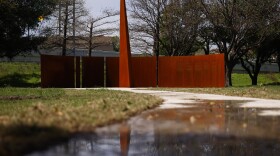A new historical marker at the White Rock Cemetery Garden of Memories honors a vital piece of Dallas’s Black history.
The more than 170-year-old cemetery, located in North Dallas, dates back to the Reconstruction era and serves as the final resting ground for formerly enslaved pioneers, farmers and prominent Black landowners who shaped the area. Although it is one of Dallas’ oldest cemetery sites, its location behind apartment complexes has left it overlooked.
“It puts a face of inclusion in Dallas that the founders of Dallas were not all white male patriarchs,” said Remembering Black Dallas member Edward Gray.
The organization and the White Rock Cemetery Garden of Memories, Inc. are scheduled to hold a dedication ceremony Saturday to keep Dallas residents aware of the Black history North Dallas carries. RBD works to educate the public through tours highlighting freedman towns and notable people like Anderson Bonner, Henry Keller and George Coit, prominent Black landowners buried in the cemetery.
Glenn Bonner is White Rock Cemetery’s caretaker and a direct descendant of Anderson Bonner. For him, the marker is an opportunity to honor and preserve his family legacy while ensuring the cemetery’s historical value is no longer hidden.
“The spirit and the souls that exist within the confines of this property, they run deep within us and all of our family members,” Bonner said.
Remembering Black Dallas has put up several markers around the city this past year, but Gray said this one is particularly meaningful. The organization wanted to make sure the families are represented respectfully as they reclaim overlooked heritage.
“This is not just a situation where we put together a marker and place it,” said Gray. “We also put a marker together and we're placing it on holy ground.”
He said RBD intends to continue planning for more markers around the city.
“[RBD Founder] Dr. George Keaton said that there is no such thing as Black history, it's American history,” said Gray. “We all are intertwined in this.”
Zara Amaechi is KERA’s Marjorie Welch Fitts Louis fellow covering race and social justice. Got a tip? Email Zara at zamaechi@kera.org. You can follow her on X @amaechizara.
KERA News is made possible through the generosity of our members. If you find this reporting valuable, consider making a tax-deductible gift today. Thank you.





